Horse Health Care Tips Owning a horse is rewarding but also a big responsibility. As an expert in equine health, I’ll help you care for your horse. This guide will talk about nutrition, vaccination schedules, hoof care, and more. It’s for everyone, from first-time owners to experienced riders. These tips aim to keep your horse healthy and happy. Now, let’s look at how to be a responsible horse owner.
Key Takeaways
- Proper nutrition is vital, including water and high-quality forage, for horse health.
- Getting regular vet care, like vaccines and deworming, prevents serious diseases.
- Don’t forget about hoof and dental care to keep your horse comfortable.
- Good grooming and handling help your horse trust you and strengthen your bond.
- Knowing a horse’s instincts and offering proper training and exercise keeps it happy and safe.
Responsible Horse Ownership and Basics
Getting a horse means you need to pick the right horse breed and horse size that suits you. Each breed is good for different things, so do your homework. A horse should be about 20% your weight and the weight of the stuff it carries. Always think about this when choosing the right size, especially if it’s your first-time buying. You should also look at what the horse knows and can do. Safety and experience are vital.
Boarding or Keeping Horses at Home
You can keep your horse at home or pay to keep it at another place. Horses need space to run, a shelter, clean water, and good food like grass. Taking care of a horse at home needs a lot of effort, even if you have a big space.
Boarding a horse makes life easier since the people there will feed and clean for you. The price you pay for boarding changes with the place and the services they provide.
Providing Proper Shelter and Housing
Horses need a clean and comfy place to live for their health. If a horse stays in a stall, clean it daily and use good bedding. Straw or shavings are good. But, avoid things like corn cobs, which can be harmful.
If a horse doesn’t go out much, put toys or other fun things in its stall. This stops it from getting bored. A horse’s living area should have fresh air and introduce new friends slowly.
Turnout, Exercise, and Social Needs
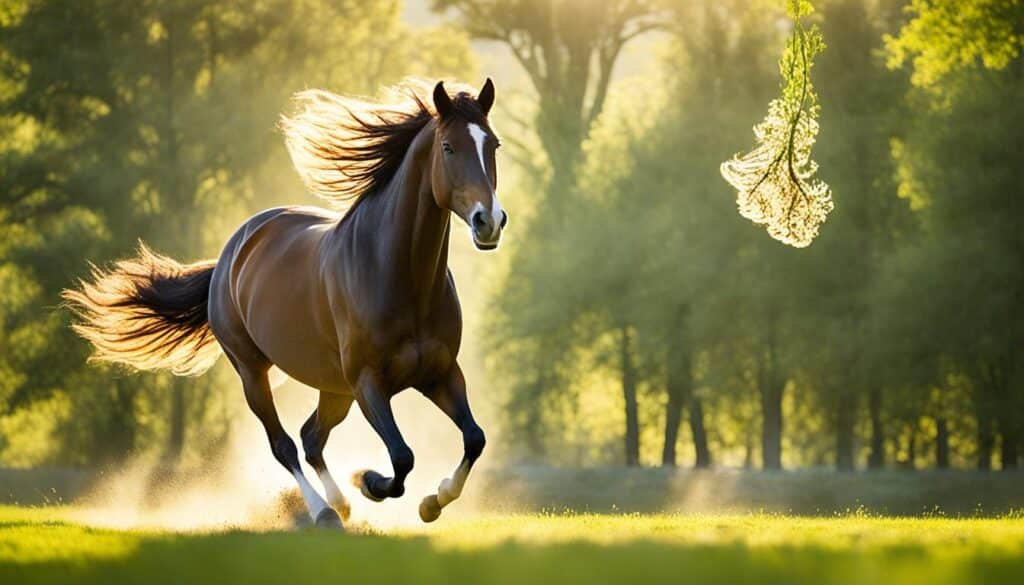
Horses love to move around and eat grass over big areas. Feral horses, or wild horses, often walk about 10 miles each day. This freedom of movement is very important for their bodies and minds. Being able to go out in a field or a drylot lets horses do what comes naturally, like grazing, playing, and socializing. It actually helps keep them healthy and happy, and cuts down on their chance of getting hurt.
If a horse can’t go out to move around, maybe because it’s hurt, that’s when we step in. By exercising them slowly, like with a bit of riding, or walking them by hand, we can keep them in good shape. It also stops them from getting too bored.
Horses are Social Herd Animals
Being together is really crucial for horses. They are social animals that love being with others like them. They feel happiest and healthiest when they can be part of a group. When they’re kept away from other horses, they can get very stressed and start acting out strangely.
But, don’t worry, there are ways to help them feel connected even if they can’t be in the same field. For example, you can let them see and smell other horses. Or, you can introduce a different animal, like a goat or a sheep, to keep them company. This makes them feel better and takes care of their social needs.
Equine Nutrition Essentials

Having clean, fresh water for your horse is crucial. They need between 5 to 15 gallons of water daily. This amount could be more in hot weather or during exercise.
Horses that don’t drink enough water can get very sick. It can cause health problems like colic and kidney issues. Make sure the water quality is good since horses may drink less if the water tastes bad or is dirty. Clean and check their water regularly. You might also want to test the water to make sure it’s safe for them to drink.
Forage as the Foundation
Horse forage, like hay or pasture, should make up most of what they eat. Horses naturally graze a lot, and limiting their forage can cause problems. They should eat 1.5% to 2.5% of their weight in forage every day. Giving them hay all the time is great, especially when they can’t be out grazing. But, some horses may have health issues that need watching, so they don’t eat too much. Testing the hay’s quality can help you feed them right.
Concentrates, Feeds, and Supplements
Some horses need more than just forage. Adding horse grain or feeds can give them extra energy and nutrients. But, too much of these can be bad for their stomachs. Ration balancers and supplements can help if you need to add something to their diet without giving them too many concentrates. An equine nutritionist can help with a feeding plan that’s just right for your horse and its needs.
Horse Health Care Tips
Taking care of your horse’s health is vital for every horse owner. It involves paying close attention to vaccinations and deworming. Also, not forgetting routine dental care and proper hoof care.
Regular Vaccinations and Deworming
Keeping your horse safe from diseases is important. This means regularly having them vaccinated and dewormed. A vet can help you make a health plan for your horse to prevent diseases. Vaccines protect against illnesses like equine influenza, rhinopneumonitis, and tetanus. Deworming helps keep them healthy by controlling internal parasites. It’s a must to stick to the vaccination and deworming schedules for good horse care.
Routine Dental Care
A horse’s teeth keep growing and changing shape. This ongoing process can cause problems like sharp points and hooks. These issues can make chewing hard and even affect the horse’s life span. So, it’s wise to have a vet check your horse’s teeth every year. They might need to smooth out any rough areas in a process called “floating”. This keeps the horse’s dental health top-notch. And, good dental care helps a horse enjoy eating and stay healthy.
Proper Hoof Care and Farrier Services
Horses need their hooves trimmed every 4 to 6 weeks, just like people need haircuts. A skilled farrier should do this. Without this care, a horse can face issues like lameness. Your farrier might also fit horseshoes if your horse needs them for more hoof protection and support. Regular farrier visits are essential. They prevent overgrowth and keep the hooves in good shape. This kind of care is key for your horse’s well-being.
Grooming and Handling
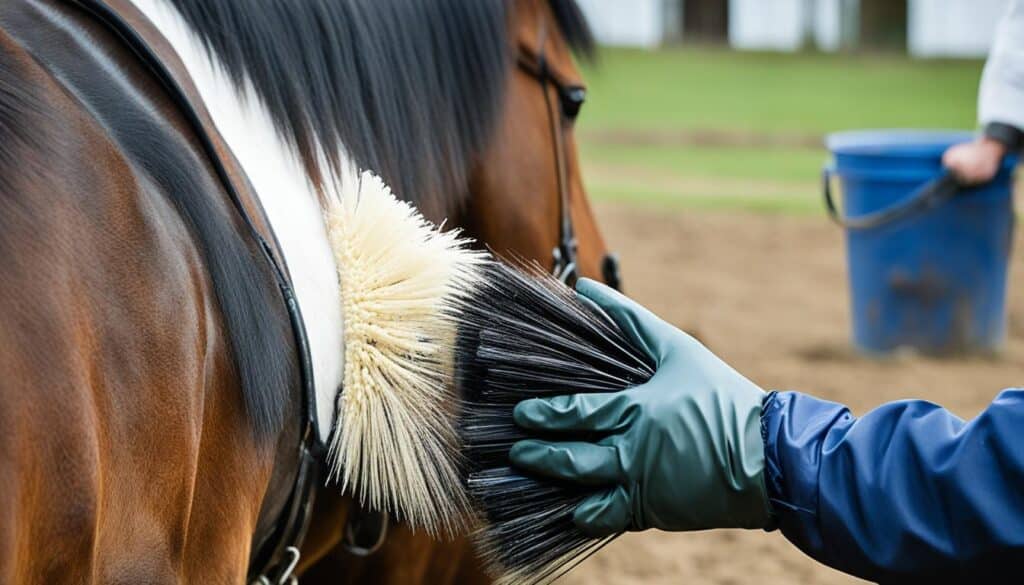
Proper horse grooming and handling are key in taking care of horses. Grooming keeps the coat and mane in good shape. It’s also a chance for the horse and its caretaker to form a bond.
Daily Grooming Benefits
Every day, brush your horse and check its feet. This is part of caring for your horse’s health. Use special tools for grooming to get rid of dirt and hair from the coat. Checking the hooves keeps the hoof health good by removing rocks. This routine helps you notice if your horse is sick or if something is different.
Handling and Building Trust
Teach kids how to groom and handle the horse right. It makes them more responsible and builds a strong bond with the horse. Remember, horses are prey animals. So, always approach them gently and avoid sudden moves that could scare them.
Spending time with your horse, doing things like grooming or leading, is important. These activities make the horse used to your presence. They learn to trust you. Earning your horse’s trust leads to better and safer interactions, whether riding or not.
Tack and Equipment Care
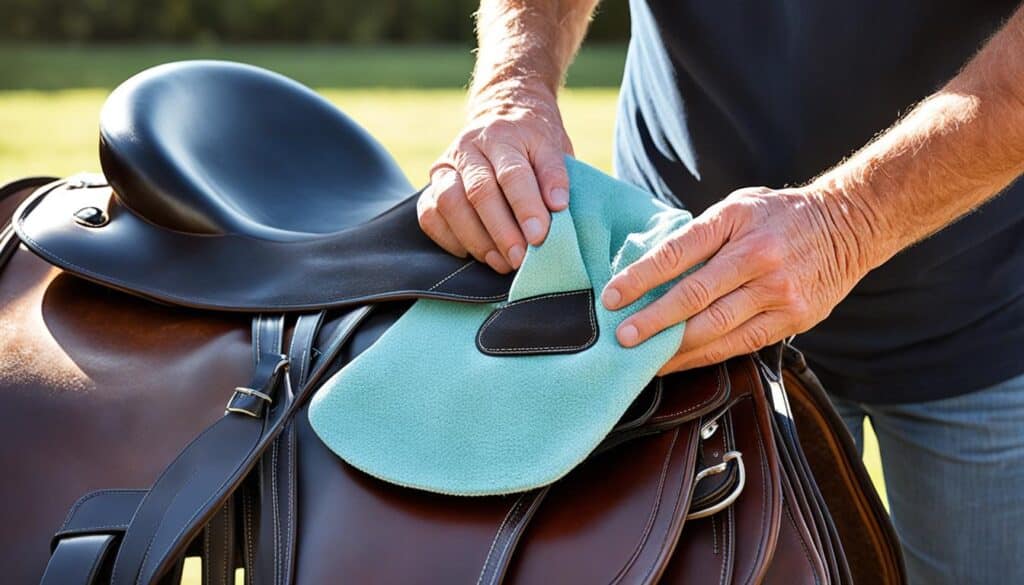
It’s crucial to have the right saddle and bridle for the horse and rider’s comfort and performance. A well-fit saddle is very important. An incorrect fit could hurt the horse. Keep your tack like the saddle and bridle clean and checked. This care helps them last longer and avoid harm that could cause safety problems. If you work with a skilled saddle fitter, you’ll get the best fitting saddle and learn how to take care of it well.
Saddle Fitting and Maintenance
Finding the perfect horse saddle fit is key for the horse’s comfort and health. The right saddle can stop back pain, sore muscles, and lameness. Often check your saddle for any damage like loose threads or leather cracks. Fixing these issues early keeps it comfy and safe for the horse.
Cleaning and Conditioning Tack
Caring for saddle fit, you must clean and condition your tack and equine equipment often. Clean the saddle, bridle, and other leather gear right after riding to get rid of dust, sweat, and salt. Use the right conditioning products to soften and protect the leather from damage. Taking good care of your tack makes it last and keeps the horse comfortable and safe.
Training and Riding
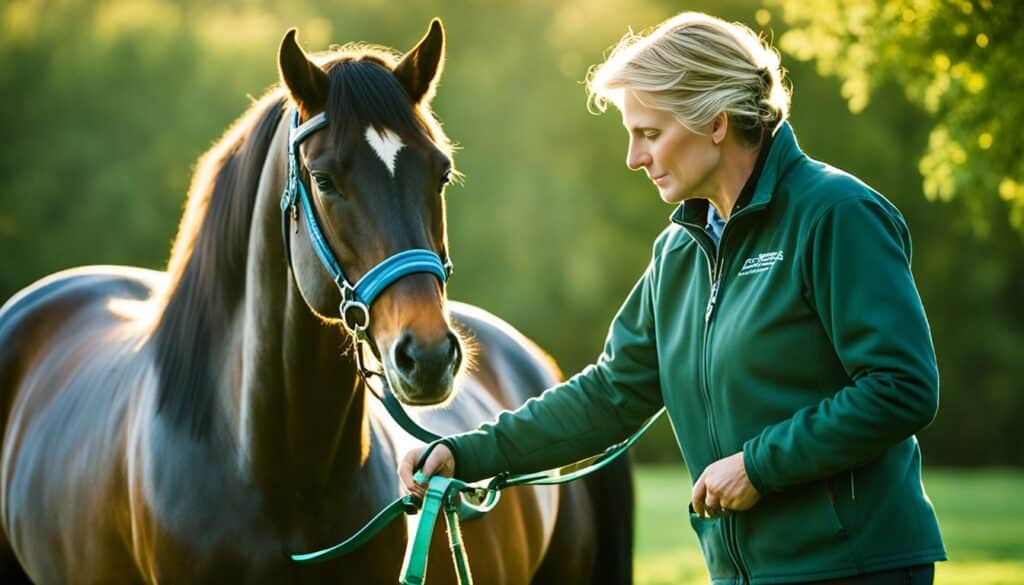
Even if you’re skilled in owning horses, taking regular lessons can help. You get feedback on your riding and how the horse performs. This insight is always useful. Many boarding places have trainers on hand. Or, you can hire someone to train you and your horse privately.
Following a structured training program, be it for basic tasks or high-level shows, can really boost your skills with horses. It also helps strengthen the bond between you and your horse.
Understanding Your Horse’s Instincts
Horses see the world very differently because they’re prey animals, not predators like humans. It’s crucial for owners to grasp this difference. Understanding how much a horse sacrifices to trust a “predator” (us) helps us be safer around them. This means we learn to train them carefully, watching for signs they’re afraid or uncomfortable. It’s about timing the training right and stopping when it’s too much, to avoid any bad memories that might cause problems later.
Veterinary Care and Management
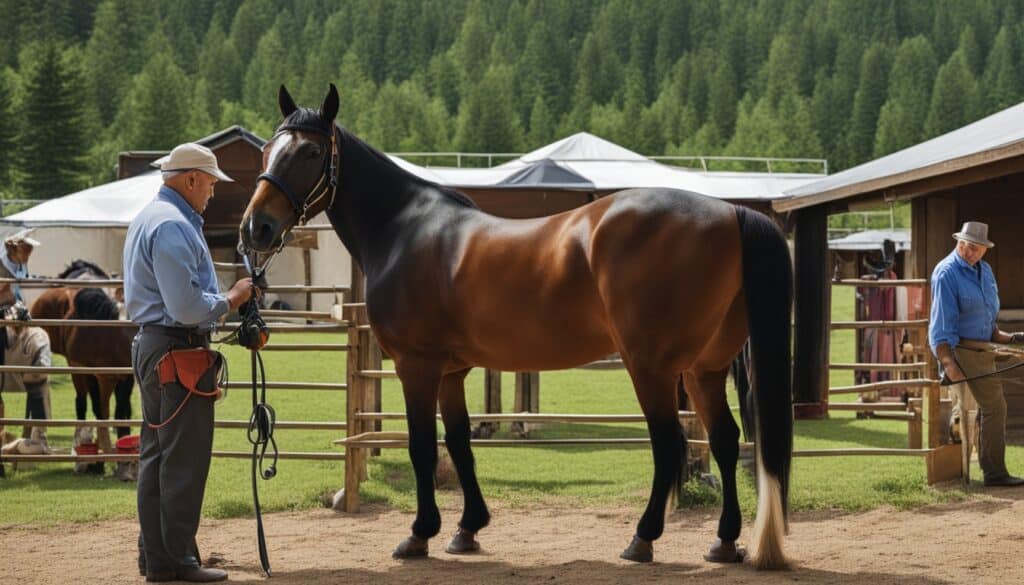
Horse owners need to team up with a vet for a good equine veterinary care plan. This plan should include annual wellness exams. Even if the horse seems healthy, these check-ups are important. The vet looks at the horse, finds any hidden issues, and gives needed shots and medicine.
Owners usually also choose to test their horse for equine infectious anemia (Coggins test) during these exams. This test is a must for traveling between states or staying at horse events.
Owners must be ready for any horse emergency care events. This means having a way to get the horse to a hospital fast. They should also keep equine first aid items and know how to use them. Knowing about things like colic and when to get the vet is crucial.
Planning for disasters and taking good care of your horse’s health is key. It helps make sure your horse stays safe during sudden events or natural disasters.
Conclusion
Caring for a horse is a big job that requires a lot of dedication. This dedication is to ensure the horse is healthy and happy. In this article, we’ve provided expert tips for horse owners to follow. These tips cover nutrition, vaccinations, grooming, and more.
Successful horse ownership is a mix of knowledge, hard work, and love for the horse. It’s about understanding and meeting the horse’s needs. This includes their health, how they think, and their social life. Doing this helps in creating a strong and enjoyable bond with your horse.
Taking care of a horse means more than the basics. It’s understanding their emotions and social life too. With care and knowledge, the relationship between horse and owner flourishes. This leads to many years of happiness for both the owner and horse.
FAQs
Q: What are some basic needs for horse care?
A: Basic needs for horse care include proper shelter, access to clean water, high-quality feed, and regular exercise.
Q: Why is routine professional care important for horses?
A: Routine professional care is essential for maintaining the health and well-being of horses. This includes regular visits from a veterinarian and a farrier to address any health or hoof issues.
Q: How can I ensure parasite control for my horse?
A: Proper parasite control involves deworming your horse regularly and keeping their living environment clean to minimize the risk of infestation.
Q: What is preventative veterinary care for horses?
A: Preventative veterinary care for horses includes vaccinations, dental check-ups, and overall health assessments to catch any potential issues early on.
Q: Why is it important to keep your horse in good physical condition?
A: Keeping your horse in good physical condition is crucial for their overall health and performance. Regular exercise, proper nutrition, and grooming are key factors in maintaining your horse’s well-being.
Q: How often should a horse receive farrier care?
A: Horses should receive farrier care every six to eight weeks to ensure proper hoof health and to prevent issues like uneven wear or lameness.
Q: What are the essential aspects of equine health that every owner should focus on?
A: Owners should focus on maintaining good digestive health, providing essential nutrients, and implementing a comprehensive care program to keep their horse healthy and happy.
Source Links
- https://www.thesprucepets.com/horse-care-tips-and-tricks-5425423
- https://madbarn.com/basic-horse-care-guide/
- https://horseandrider.com/horse-health-care/healthy-horse-care-tips-13080/




